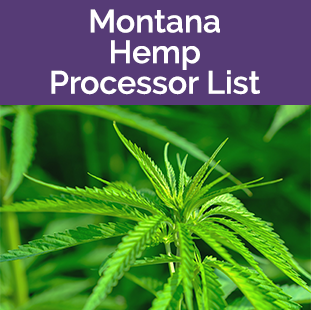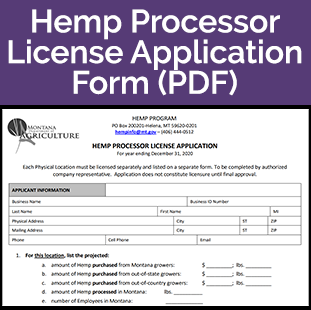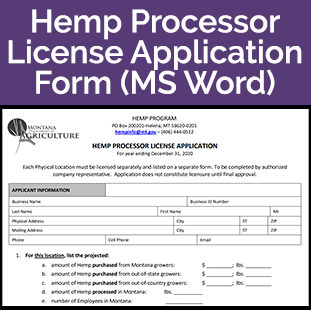Hemp Processor License
The department has created a hemp processing license to provide consistency and comply with new United States Department of Agriculture (USDA) oversight established in the 2018 Farm Bill. The proposed rule will help the Department of Agriculture avoid jurisdictional confusion with the Department of Public Health and Human Services (DPHHS) and allow new businesses to have some degree of regulatory certainty.
The rules allow persons wanting to process hemp plants or plant parts to apply for a Hemp Processor license. The processor license allows licensees to produce derivatives that may be included in products for food, fiber, oils, supplements or drugs (excluding THC) for the wholesale or ingredient market. Hemp processors must comply with city, county, and tribal ordinances and laws. The approval of manufactured hemp derived products at the retail level continue to be subject to the laws and regulations of the United States Food and Drug Association (FDA) and the Montana Department of Public Health and Human Services (DPHHS).
An applicant may apply for a license to process hemp floral and root extracts (Part A) and/or to process hemp grain, seed, seed oil and fiber (Part B) on the same application form. Part A is required of persons who process hemp floral or root extracts and the fee is $2,500 per calendar year. Part A also allows for the processing of hemp grain, seed, seed oil and fiber. Part B is voluntary and only allows for the processing of hemp grain, seed, seed oil and fiber, the fee is $1,000 per calendar year.
The license expires on December 31 of each calendar year. The application period will remain open throughout the year. Persons who have a current and compliant hemp Grower’s license can process their own hemp production without a Processor license.
Each physical location that conducts processing must be licensed separately and applied for on a separate form. A physical location is defined as processing and storage/warehouse structures within a 1-mile radius.
A hemp processor is subject to an inspection that may include THC testing, pesticide testing or any other testing requested by law enforcement or the department. All hemp and the products/by-products derived from hemp must comply with state and federal law. THC extracted from hemp plants or hemp floral extraction must be legally disposed of in a manner consistent with state and federal regulations. Manufacturers purchasing from licensed hemp processors in Montana are not required to possess a hemp Processor’s license.
Hemp Processing - Commodity Dealer Exemption
The department recognizes a need for regulatory flexibility to allow new market entrants in the hemp industry. As such, the department is providing a temporary exemption for the Commodity Dealer license in calendar year 2019 and 2020. However, producers and buyers alike should be aware of the potential dangers associated with doing business with or as non-bonded processors. The hemp industry has associated risks that are not inherent to traditional commodity trading. The department continues to encourage buyers to acquire a Commodity Dealer and/or Commodity Warehouse license through the normal channels and for growers to vet any buyer of their hemp crop. However, a person or entity who possesses a hemp Processor license may contract with licensed Montana hemp growers without a Commodity Dealer license under the following conditions:
- the hemp producer signs a written statement, acknowledging the hemp processor is not a licensed commodity dealer in Montana and that the processor does not have a commodity dealer bond; the Processor must keep the written record on file for a minimum of 1-year after the purchase of any product,
- the total amount of contracted hemp does not exceed $10 million in the license year; or
- they are purchasing or processing hemp stalks for fiber.
- Additionally, hemp processors are subject to all remedies of the department included in Section 80-4-612, MCA, and powers of inspection included in Section 80-4-601, MCA. In the event a hemp processor does not pay a licensed hemp producer possessing a contract that would otherwise be subject to Agricultural Commodity Dealer laws, the department may pursue remedies.
Montana Rules and Code: Hemp

- Montana Alternative Agricultural Crops (Hemp) Act - Montana Code and Administrative Rules: An unofficial compilation of the state’s regulations related to the Montana Hemp Program
- Administrative Rules of Montana (ARM) 4.19.1: Hemp Processing License and Fee
- Administrative Rules of Montana (ARM) 4.19.202: Hemp Processing for a Commodity Dealer




